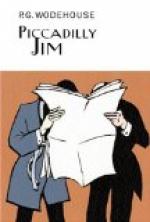“What are you eating, boy?” demanded Mr. Pett, his disappointment turning to irritability.
“Candy.”
“I wish you would not eat candy all day.”
“Mother gave it to me,” said Ogden simply. As he had anticipated, the shot silenced the enemy’s battery. Mr. Pett grunted, but made no verbal comment. Ogden celebrated his victory by putting another piece of candy in his mouth.
“Got a grouch this morning, haven’t you, pop?”
“I will not be spoken to like that!”
“I thought you had,” said his step-son complacently. “I can always tell. I don’t see why you want to come picking on me, though. I’ve done nothing.”
Mr. Pett was sniffing suspiciously.
“You’ve been smoking.”
“Me!!”
“Smoking cigarettes.”
“No, sir!”
“There are two butts in the ash-tray.”
“I didn’t put them there.”
“One of them is warm.”
“It’s a warm day.”
“You dropped it there when you heard me come in.”
“No, sir! I’ve only been here a few minutes. I guess one of the fellows was in here before me. They’re always swiping your coffin-nails. You ought to do something about it, pop. You ought to assert yourself.”
A sense of helplessness came upon Mr. Pett. For the thousandth time he felt himself baffled by this calm, goggle-eyed boy who treated him with such supercilious coolness.
“You ought to be out in the open air this lovely morning,” he said feebly.
“All right. Let’s go for a walk. I will if you will.”
“I—I have other things to do,” said Mr. Pett, recoiling from the prospect.
“Well, this fresh-air stuff is overrated anyway. Where’s the sense of having a home if you don’t stop in it?”
“When I was your age, I would have been out on a morning like this—er—bowling my hoop.”
“And look at you now!”
“What do you mean?”
“Martyr to lumbago.”
“I am not a martyr to lumbago,” said Mr. Pett, who was touchy on the subject.
“Have it your own way. All I know is—”
“Never mind!”
“I’m only saying what mother . . .”
“Be quiet!”
Ogden made further researches in the candy box.
“Have some, pop?”
“No.”
“Quite right. Got to be careful at your age.”
“What do you mean?”
“Getting on, you know. Not so young as you used to be. Come in, pop, if you’re coming in. There’s a draft from that door.”
Mr. Pett retired, fermenting. He wondered how another man would have handled this situation. The ridiculous inconsistency of the human character infuriated him. Why should he be a totally different man on Riverside Drive from the person he was in Pine Street? Why should he be able to hold his own in Pine Street with grown men—whiskered, square-jawed financiers—and yet be unable on Riverside Drive to eject a fourteen-year-old boy from an easy chair? It seemed to him sometimes that a curious paralysis of the will came over him out of business hours.




